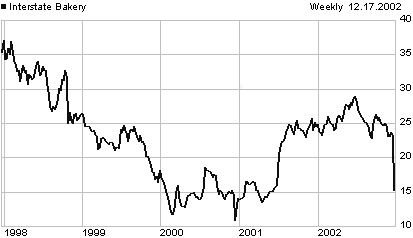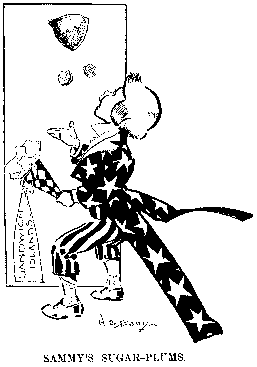Deaths
which occurred on a 17 December:
2002
Ten members of Algerian security forces, in an ambush by Islamic
militants in the Zaccar mountains. Algeria's Islamic insurgency has claimed
an estimated 120'000 lives since it started in 1992 after the army canceled
legislative elections that an Islamic party was sure to win.
2001
Pvt. James Carl Rogers, from Swansea, South Wales, serving with
the Royal Regiment of Wales, based on a peacekeeping mission in Pristina,
Kosovo, since mid-November 2001, shot once in the head by his own weapon,
apparently by accident.
2001 Mohammad Jamaan Hanidak,
13, shot in the chest by Israeli troops in Khan Younis, Gaza Strip, while
standing outside his house holding a plastic toy rifle. Mahmoud
Fadel Hanidak, 12, is also shot and, taken to the hospital, is
declared clinically dead.
2001 Munjed Mohammad Khaled Salaman,
22, and Muntasar Abu Mustafa, 18, shot at about noon by an Israeli
tank stationed at the entrance of the Rafidiah neighborhood in Nablus, while
they were standing at a phone booth. They were both members of the PA's
naval police force — which also conducts operations in the landlocked
West Bank — and that they were patrolling the area in order to keep
Palestinian gunmen from approaching or opening fire on Israeli troops.
2001 Yakub Idkidakh, 28, a senior activist in Hamas's military
wing (name reported as Yaaqoub Fathi Dkedik by Wafa Palestinian news agency).
Israeli soldiers come to his house in the Palestinian-controlled portion
of Hebron early in the morning to arrest him, but shoot him when he tries
to flee. Israelis say that Idkidakh was involved in planning both ordinary
and suicide bombings, both in Israel and in the territories. Hamas vows
to avenge his death despite Arafat's call to cease terrorist operations.
2001 Two guards and two passers-by, at the Port-au-Prince
National Palace, as a commando attacks it in an apparent failed
coup attempt.
2000: 3 children, 2 women, and 6 men,
by gunmen in Chipaque, 16 km south of Bogotá. According to the government,
the gunmen are rebels of the "Revolutionary Armed Forces" of Colombia.
Right-wing paramilitary gunmen have also committed numerous civilian massacres.
During the first eight months of 2000, 1,389 people were slain in 314 massacres
in Colombia, according to human rights monitors.
2000 Chu
Congrui, 30, her death is notified by police to her family in Tiande
(Jilin province, China), who find bruises on her body and blood around her
ears, signs that she had died from severe police beatings. She was under
arrest since 1 December for participating in a Falun Gong protest on Tiananmen
Square.
2000 Luis Claramunt, pintor español.
1987 Bernard Cardinal Alfrink, 87, cardinal of Ultrecht
Netherlands
1987 Marguerite Yourcenard, 84, author
(Memoirs of Hadrien)
1950 At least 44 shipyard workers
as Polish soldiers, on orders from defense minister General Wojciech Jaruzelski,
shoot into crowd protesting food-price increases, in the Baltic coast cities
of Gdynia, Gdansk, Szczecin and Elblag. More than 1000 are injured. Jaruzelski
would be Poland's communist ruler from 1981 until the regime's demise in
1989. In November 2001 Jaruzelski, now 78, would be tried in a Warsaw court
for the massacre.
1940 Stott,
mathematician.
1939 German pocket battleship Graf Spee scuttled by its crew off
Uruguay
1939 Day 18 of Winter War: USSR
aggression against Finland. [Talvisodan
18. päivä]
More deaths due to Stalin's desire to grab Finnish territory.
Central Isthmus: this morning Soviet infantry and tanks launched
their first major offensive at Summa. The tanks penetrate the Finnish
positions, but the infantry are held at the front line.
Eastern Isthmus: at 08:15 Soviet troops continue the offensive
at Taipale. The attempted breakthrough is thwarted mainly by Finnish
artillery fire.
Northern Finland: fighting to retake the parish village at Suomussalmi
continues.
Petsamo: the vanguard of the Russian regiment overcomes the Finnish
holding detachment near Porojärvi. Detachment Pennanen retreats
to the River Kornettijoki, 120 km south of Petsamo. The fighting
disperses into skirmishes between patrols.
Ladoga Karelia: Finland is forced to send 17-19-year-old schoolboys
into battle at Salmi.
Mursula: the Finnish force fighting at Mursula on the shores of
Lake Ladoga lose 26% of its strength and has to retreat. 32 Finnish
soldiers are dead or missing. The enemy loses 300 men.
Helsinki: Isoviha ('The Great Wrath'), directed by Kalle
Kaarna, receives its premiere screening in Helsinki. Starring Hilkka
Helinä, Kalevi Mykkänen and Santeri Karilo, Isoviha was banned during
the negotiations on the eve of the war, and the version screened
now is still partly censored.
Neuvosto-joukkojen suurhyökkäys
jatkuu Taipaleessa Summassa alkaa aamulla
neuvostopanssareiden ja jalkaväen ensimmäinen suurhyökkäys.Panssarit
pääsevät asemiin, mutta jalkaväki pysäytetään etulinjaan.
Taipaleessa jatkuu neuvosto-joukkojen suurhyökkäys klo 8.15 alkaen.Hyökkäysyritys
torjutaan pääasiassa tykistötulella.
Petsamossa venäläisrykmentin kärki lyö viivyttävän suomalaisosaston
Porojärven tasalla.
Suomussalmella jatkuvat taistelut kirkonkylän takaisin valtaamiseksi.
Osasto Pennanen vetäytyy Kornettijoelle 120 km Petsamosta etelään.Taistelut
laantuvat partiosodaksi.
Salmin lohkolla taisteluun on jouduttu lähettämään 17-19 vuotiaita
koulupoikia.
Suomalaisjoukot menettävät Mursulan taistelussa Laatokan rannalla
26% vahvuudestaan ja joutuvat perääntymään. 32 suomalaista kaatuu
tai katoaa. Vihollinen menettää 300 miestä.
Kalle Kaarnan ohjaaman elokuvan Isoviha kantaesitys on Helsingissä.Elokuvan
pääosissa ovat Hilkka Helinä, Kalevi Mykkänen ja Santeri Karilo.Elokuvaa
sensuroidaan jonkin verran, ja se on ollut sotaa edeltäneiden neuvottelujen
ajan kokonaan kielletty. |
1935 Juan Vicente Gómez, presidente venezolano.
1927
All 34 aboard US sub 'S-4' as it sinks after collision.
1909 Leopold II king of the Belgians.
1907 William
Thomson (Lord Kelvin), 83, mathematician. — físico británico,
uno de los fundadores de la termodinámica y precursor de la teoría electromagnética.
1890 Charles Shave Head,
First Sergeant of Police, dies in the morning, 25 hours after being
injured in the fight that resulted from the attempt to arrest Sitting
Bull by 39 Indian policemen directed by James McLaughlin, Indian Agent
at Standing Rock Reservation.
An
Account of Sitting Bull's Death
by McLaughlin (dated 12 January 1891): http://www.pbs.org/weta/thewest/wpages/wpgs680/sbarrest.htm
(The report says the arrest attempt was early on 16 December, Britannica
has 15 December) |
1881 Lewis Henry Morgan, estadounidense, fundador de la
antropología como ciencia.
1853 Anstice,
mathematician.
1830 Simon Bolivar, 47, hero of independence
from Spain, president of Colombia. — general, dirigente de la independencia
de las Repúblicas de Venezuela, Colombia, Ecuador, Perú, Bolivia y Panamá,
muere en los alrededores de Santa Marta (Venezuela).
1813
Antoine Auguste Parmentier, farmacéutico francés, impulsor del
consumo de la patata.
1806 Thomas Beach, British
artist born in 1738. — LINKS
— The
Hand That Was Not Called
1794 François Nicolas
Vincent, político francés.
1765 Ercole Graziani II,
Italian artist born in 1688
1686 Liéve Pieterszoon
Verschuur (or Verschuir), Dutch artist born in 1630. |
 On
a 17 December:
On
a 17 December:  at
Kitty Hawk, North Carolina, not counting that of
at
Kitty Hawk, North Carolina, not counting that of 
 1900
First prize of 100'000 francs is offered for communications with
extraterrestrials. Martians excluded--considered too easy.
1900
First prize of 100'000 francs is offered for communications with
extraterrestrials. Martians excluded--considered too easy.